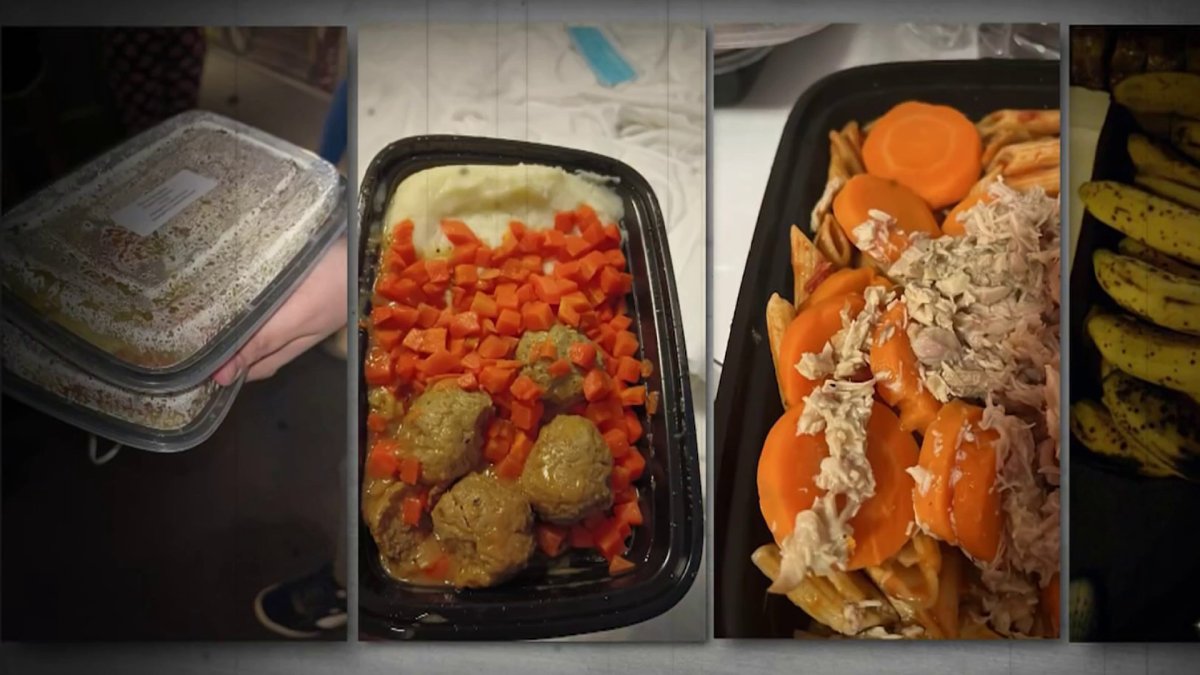
Melissa Russo reporting on the poor food options available for migrants.
Raw, cold and expired. That's how refugees living at the Row Hotel in Manhattan describe the food they're being served by the city.
Those who are being housed in the Times Square hotel point to pasta covered in spoonfuls of grease and meatballs that are frozen in the middle when they're served. They are also pushing back against shelter staff who told the New York Post that they are wasting taxpayer dollars by refusing to eat the free meals.
"Sometimes the food smells bad. Rotten. And every time the children eat food, it's like that they got food poisoning," said one mother, Diana, who is staying at the shelter with her two children.
Get Tri-state area news and weather forecasts to your inbox. Sign up for NBC New York newsletters.
But Mayor Eric Adams implied on Thursday that the food is not the problem, but rather that the migrants are just being picky.
"People might have a different cultural taste for certain foods -- we can't do that. We can only provide nutritional food for people," he said,
Adams and the hospital boss now running the Row Hotel shelter, which has become home to hundreds of Latin American migrants, insist there's nothing wrong with the food there. But a letter sent out last month from Harlem Hospital asks the Row Hotel to transfer a family out because of parent's concerns their "children lost weight due to limited food resources."
A mother of three said that it's "not a case of what my children like or don't like. If the food was edible, I would make them eat it."
In recent months, the city has had to scramble to house thousands of migrants bussed from the border, using emergency hotels as shelter destinations -- many of which do not have cooking facilities.
Another mother, Rosalina, said her shelter on 32nd Street rejected a written request from her son's pediatrician, after 4-year-old Anthuan had an acute illness. The doctor asked the shelter to provide bland food, and housing with a kitchen.
In a statement, Anthuan's pediatrician Dr. Kendall Rao said that "among the pediatric asylum-seeking patients that I have been seeing, there has been an increase in the number of children reporting gastrointestinal issues including poor appetite, nausea, vomiting, diarrhea and constipation. Many of these young children seem to be having a difficult time adjusting to the food here. It seems to be causing a shock to their developing digestive systems."
Anthuan says he keeps telling his mom he's hungry, asking what they have to eat at their temporary new home. The clinic where Dr. Rao works has seen more than 150 refugee children since the start of the migrant crisis.
City Councilmember Julie Won, who chairs the Contracts Committee, said the city is starving some of the hotels -- paying only $3-$4 per person per day for food.
"Can you imagine what that means, if it's $3.44 for three meals -- what does that mean per dish? It costs $1 and something cents? Can you image what the groceries must be to create that meal -- what what are you eating? What are you feeding people?" Won asked.
The councilmember said she plans to hold a hearing on the subject.
A spokeswoman for Mayor Adams says all guests in the hotels are offered a food selection that reflects their diets and is prepared same day to ensure freshness. They say that all guests were surveyed about their preferences for food and that the city is going to try to avoid waste in the future by only ordering the number of meals that residents say they want.